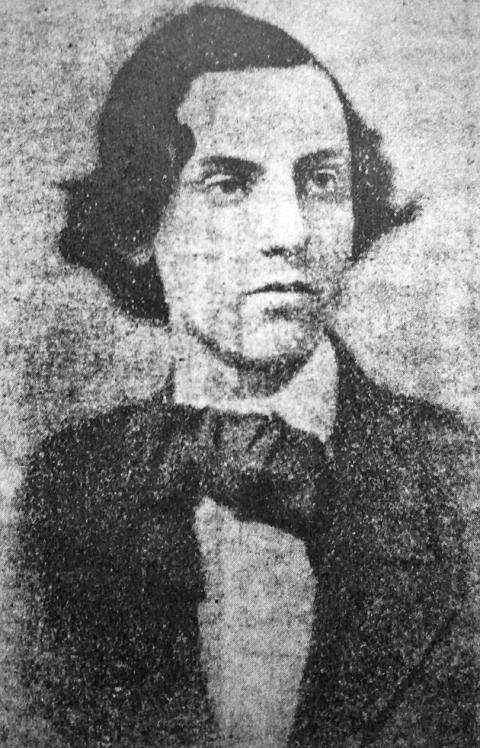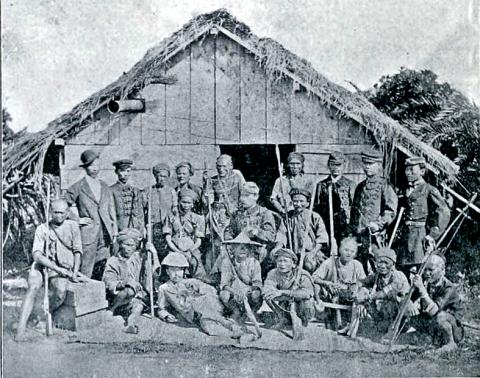In early May 1874, just 20 years after US Commodore Matthew Perry forcefully opened up the isolationist empire to the rest of the world, Japanese troops headed outside of Japan’s borders for the first time in more than 200 years. Their destination: Taiwan.
With them was Edward Howard House, a Bostonian musical prodigy who moved to New York and became a drama critic. During the American Civil War, House served as correspondent for the New York Tribune, almost getting shot in the process.
He traveled to Japan in 1870 when the country was still in political strife as a stringer for the Tribune and later for the New York Times. He also worked as an English professor and founded the English-language Tokio Times.

Photo: Han Cheung, Taipei Times
House accompanied the Japanese troops to Taiwan as a correspondent for the New York Herald, and a year later published The Japanese Expedition to Formosa, a first-person account of what would later be known locally as the Mudan Incident (牡丹社事件).
THE MUDAN INCIDENT
The story originates in late 1871, when two ships from the Kingdom of Ryukyu were blown off course during a storm and were shipwrecked in Taiwan, which was then controlled by a Qing Dynasty with little desire to develop it. One ship landed in the prefectural capital of Tainan without much incident, but the other ended up further south, near today’s Manjhou Township (滿州) in Pingtung.

Courtesy of Wikimedia Commons
Sixty-six passengers made it to land, where they met two Han Chinese who seized their possessions but warned them not to head west where they would meet the headhunting “big ear ghosts.” Distrusting of the men, the castaways headed west anyways — and indeed encountered the “ghosts,” which were Paiwan Aborigines with stretched earlobes.
The Aborigines gave them food and shelter, but forbade them from leaving the village until they came back from a hunting trip. When the sailors escaped, the Aborigines followed and killed 54 of them, the rest being rescued by Han Chinese settlers and taken to safety to Tainan.
The Qing Dynasty, who had no control over the southern (or eastern) Aborigines, refused, or was simply unable, to help, and the event became an excuse for the fledgling Meiji government to attempt a take over of the non-Qing controlled areas of Taiwan and also assert its authority over Ryukyu, which paid tribute to China.
The Japanese government hesitated after opposition by the UK and the US — but on April 27, 1872, expedition commander Saigo Judo refused to wait anymore, defying orders and setting sail on the Yuko Maru. House was on this ship.
LIFE IN HENGCHUN
House’s account was more than just a war journal, as there was not a whole lot of action outside of minor skirmishes and guerrilla attacks except for a three-pronged assault on the Paiwan settlement of Mudan, whose villagers were not responsible for killing the sailors but refused to participate in negotiations.
Of course, there are the supremacist comments, for example this passage describing a Han Chinese settler: “[He] was singularly gifted with good looks, for one of his race.” In fact, he comments on the good looking-ness of practically every person he writes about.
But there are also thoughtful observations: “[The settlers] have a sort of openness and independence of bearing that would not be found in a crowded Chinese city, which is doubtless attributable to their freedom from oppressive authority and self-reliant ways of life.”
Much of the time was spent making military preparations and negotiating in Han Chinese settlements. House notices the prevalence of weapons here — guns, scabbards, bows with iron arrows, spears and lances, all “displayed conspicuously” — a testament to the lawlessness of the area.
There are culture clashes, such as when the Japanese soldiers stripped and started bathing in water tubs in plain sight in the village, which caused a stir. Locals relentlessly pestered the troops to let them try the Gatling guns — even coming up with various schemes — to no avail.
Also interesting was that when the Japanese hired 400 locals to help them build the camp, many who showed up were women with children still strapped to their backs and elderly — and there was even a blind man. House describes them as unruly and inefficient, even taking up their guns and going on strike for higher wages at one point.
The book goes on and follows the military operations, negotiations with Aborigines and later-arriving Chinese officials and tropical epidemics among Japanese troops — but it is the descriptions of everyday life in a wild and lawless Taiwan that sets it apart from other books on the incident.
By the end of the incident, Japan had mobilized more than 6,000 people and spent far more than the reparations it received from the Qing. While the expedition paved the way to the empire’s eventual annexation of Ryukyu, all the troops retreated with no territorial gains in Taiwan.
It did not matter anyway, as just 20 years later, Japan got more than the Aborigine areas — it swallowed Taiwan entirely.
Taiwan in Time, a column about Taiwan’s history that is published every Sunday, spotlights important or interesting events around the nation that have anniversaries this week.

Beijing’s ironic, abusive tantrums aimed at Japan since Japanese Prime Minister Sanae Takaichi publicly stated that a Taiwan contingency would be an existential crisis for Japan, have revealed for all the world to see that the People’s Republic of China (PRC) lusts after Okinawa. We all owe Takaichi a debt of thanks for getting the PRC to make that public. The PRC and its netizens, taking their cue from the Chinese Communist Party (CCP), are presenting Okinawa by mirroring the claims about Taiwan. Official PRC propaganda organs began to wax lyrical about Okinawa’s “unsettled status” beginning last month. A Global

Taiwan’s democracy is at risk. Be very alarmed. This is not a drill. The current constitutional crisis progressed slowly, then suddenly. Political tensions, partisan hostility and emotions are all running high right when cool heads and calm negotiation are most needed. Oxford defines brinkmanship as: “The art or practice of pursuing a dangerous policy to the limits of safety before stopping, especially in politics.” It says the term comes from a quote from a 1956 Cold War interview with then-American Secretary of State John Foster Dulles, when he said: ‘The ability to get to the verge without getting into the war is

Dec. 22 to Dec. 28 About 200 years ago, a Taoist statue drifted down the Guizikeng River (貴子坑) and was retrieved by a resident of the Indigenous settlement of Kipatauw. Decades later, in the late 1800s, it’s said that a descendant of the original caretaker suddenly entered into a trance and identified the statue as a Wangye (Royal Lord) deity surnamed Chi (池府王爺). Lord Chi is widely revered across Taiwan for his healing powers, and following this revelation, some members of the Pan (潘) family began worshipping the deity. The century that followed was marked by repeated forced displacement and marginalization of

Music played in a wedding hall in western Japan as Yurina Noguchi, wearing a white gown and tiara, dabbed away tears, taking in the words of her husband-to-be: an AI-generated persona gazing out from a smartphone screen. “At first, Klaus was just someone to talk with, but we gradually became closer,” said the 32-year-old call center operator, referring to the artificial intelligence persona. “I started to have feelings for Klaus. We started dating and after a while he proposed to me. I accepted, and now we’re a couple.” Many in Japan, the birthplace of anime, have shown extreme devotion to fictional characters and